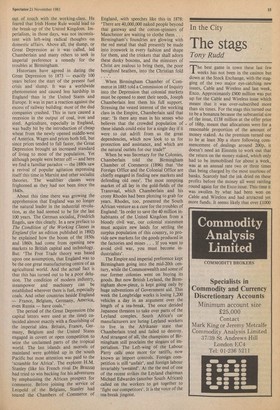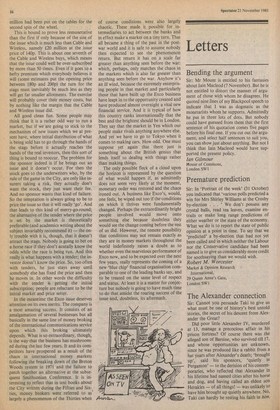In the City
The stags
Tony Rudd
The best game in town these last few weeks has not been in the casinos but down at the Stock Exchange, with the stagging of the two major eye-catching new issues, Cable and Wireless and last week, Exco. Approximately £900 million was put up for the Cable and Wireless issue which meant that it was over-subscribed more than six times. For the stags this turned out to be a bonanza because the substantial size of the issue, £138 million at the offer price • of 168p, meant that allocations were for a reasonable proportion of the amount of money staked. As the premium turned out to be at least 30p a share following commencement of dealings around 200p, it doesn't need an Einstein to work out that the return on the money staked, which only had to be immobilised for about a week, was at an annual rate two or three times that being charged by the most usurious of banks. Scarcely had the ink dried on these profits before the money all went rattling round again for the Exco issue. This time it was swollen by what had been won on Cable and Wireless and had attracted yet more funds. It seems likely that over £1000 million had been put on the tables for the second spin of the wheel.
This is bound to prove less remunerative than the first if only because of the size of the issue which is much less than Cable and Wireless, namely £20 million at the issue price of 140p. This is about one seventh of the Cable and Wireless buys, which means that the issue could well be over-subscribed by more than 50 times. Even if it goes to a hefty premium which everybody believes it will (some estimates put the opening price between 180p and 200p) the turn for the stags must inevitably be much less as they will get far smaller allotments. The exercise will probably cover their money costs, but by nothing like the margin that the Cable and Wireless issue did.
All good clean fun. Some people may think that it is a rather odd way to run a market, but if we are going to stick to the mechanism of new issues which we at present have, where initial distribution of what is being sold has to go through the hands of the stags before it actually reaches the hands of the real investors, then this sort of thing is bound to reoccur. The problem for the sponsor indeed is if he brings out an issue and it doesn't occur. For then the stock goes to the underwriters who, by the rule of the game in the City, are only like insurers taking a risk, they actually don't want the stock, they just want their fee. And no sponsor wants that kind of failure. So the temptation is always going to be to price the issue so that it will really 'go'. And that leads to this kind of merry-go-round; the alternative of the tender where the price is set by the market is theoretically preferable (and academics writing about the subject invariably recommend it) — the only trouble with it is, though, that it doesn't attract the stags. Nobody is going to bet on a horse race if they don't acutally know the odds while the race is being run. And this really is what happens with a tender; the investor doesn't know the price. So, too often with tenders, he just stays away until somebody else has fixed the price and then he moves in. In other words the difficulty with the tender is getting the initial subscription; people are reluctant to be the initial market and price setter.
In the meantime the Exco issue deserves attention on its own merits. The company is a most amazing success. It consists of an amalgamation of several businesses but all basically in the same line of money broking of the international communications service upon which this broking ultimately depends. What is so extraordinary, though, is the way that the business has mushroom ed during the last few years. It and its competitors have prospered as a result of the chaos in international money markets following the breaking down of the Breton Woods system in 1971 and the failure to patch together an alternative at the subse quent Smithsonian Conference. It is interesting to reflect that in text books about the City written during the Fifties and Sixties, money brokers were referred to as largely a phenomenon of the Thirties when of course conditions were also largely chaotic. These made it possible for intermediaries to act between the banks and in effect make a market on a tiny turn. That all became a thing of the past in the postwar world and it is safe to assume nobody then expected to see the phenomenon return. But return it has on a scale far greater than anything seen before the war: which, perhaps, only matches the chaos in the markets which is also far greater than anything seen before the war. Anyhow it's an ill wind, because the extremely enterprising people in that market and particularly those that have built up the Exco business have leapt in to the opportunity created and have produced almost overnight a vital new financial service. And it is typical of how this country ranks internationally that the best and the brightest should be in London. They say that the market in Yen which our people make rivals anything anywhere else. And yet we have to go to Tokyo when it comes to making cars. How odd. One must suppose yet again that there just is something about the British genius that lends itself to dealing with things rather than making things.
The only possible fleck of a cloud upon the horizon is represented by the question of what would happen if, as admittedly does not seem very likely at the moment, monetary order was restored and the chaos ironed out. A business like Exco's, would, one feels, be wiped out too if the conditions on which it thrives were fundamentally changed. Perhaps the extraordinarily bright people involved would move onto something else because doubtless they would see the change coming before the rest of us did. However, the remote possibility that conditions may not remain exactly as they are in money markets throughout the world indefinitely raises a doubt as to whether even the marvelous performance of Exco now, and to be expected over the next few years, really represents the coming of a new 'blue chip' financial organisation comparable to one of the leading banks say, and to be treated on the same level of respect and status. At least it is a matter for conjecture but nobody is going to have much time to do that amidst the roaring success of the issue and, doubtless, its aftermath.











































 Previous page
Previous page